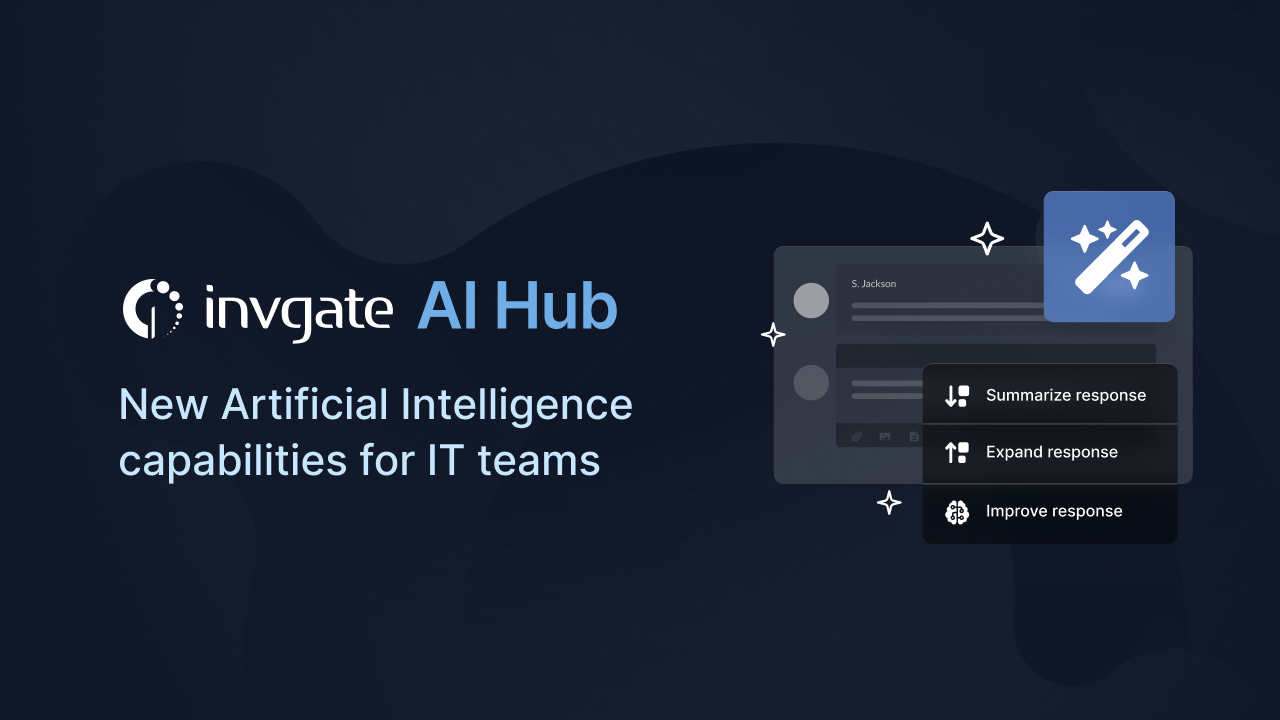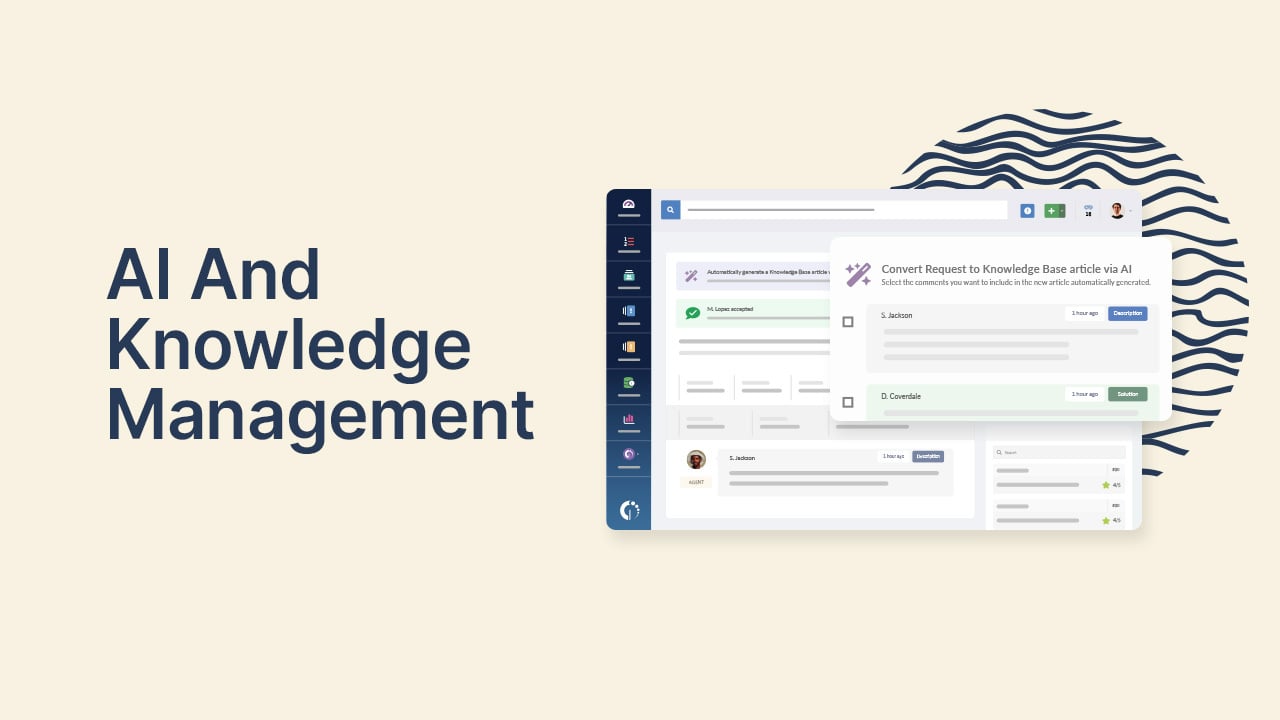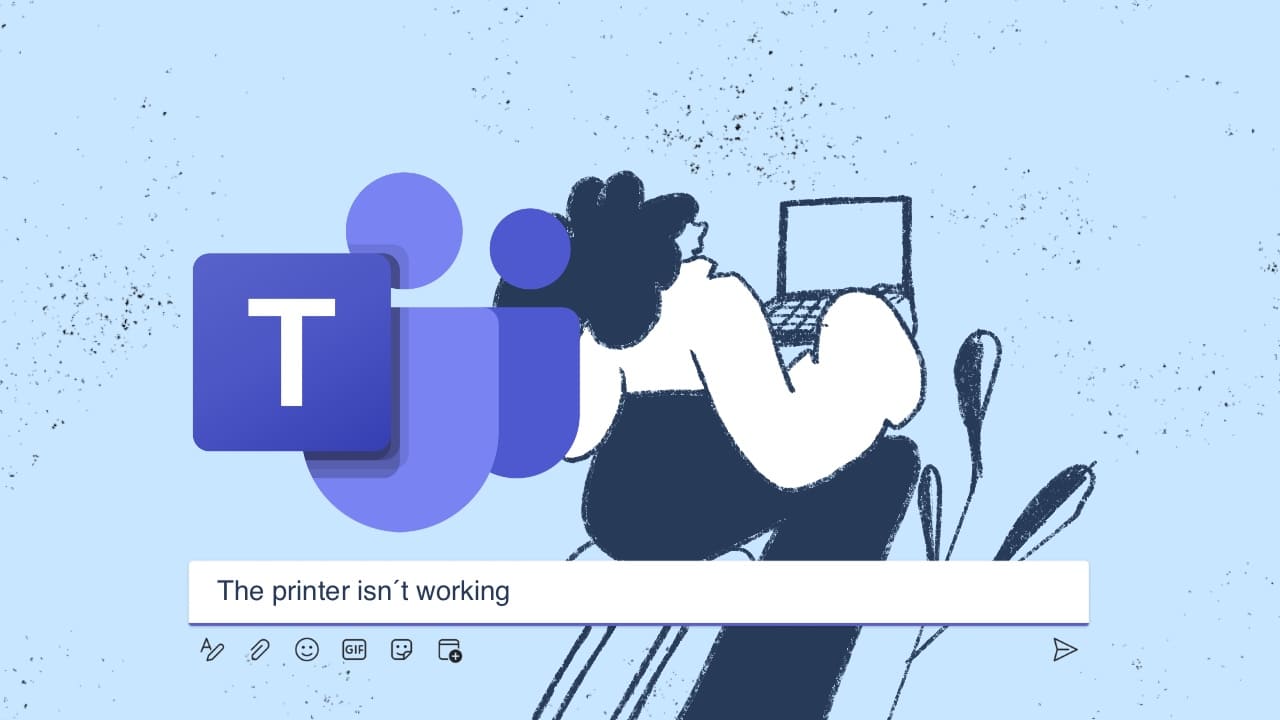Let's cut through the AI fantasy. You've read the headlines: artificial intelligence is the new electricity, the magic wand transforming businesses overnight. But in my experience working with many clients with InvGate, I've gained some valuable insights. Turns out it’s not all smoke and mirrors.
Let's dive into the real story of AI in business, far from the echo chamber of Silicon Valley buzzwords and closer to the tangible reality of everyday corporate life.

The evolution of AI: Beyond the hype
The buzz around AI has been tremendous, and rightfully so. AI technologies, particularly transformer models, have been groundbreaking. These models have revolutionized the way machines process and understand human language, offering continuity and context in conversations.
The narrative has been dominated by spectacular promises: AI transforming businesses overnight, revolutionizing how we work, and even thinking on our behalf. But the truth is less about overnight revolutions and more about strategic evolutions.
In the last year, I've seen how businesses are cautiously yet optimistically stepping into the AI arena, often grappling with the practicalities of integrating these technologies into existing business models. The challenge lies in balancing admiration for AI's capabilities with the complexities of data privacy, governance, and ethical considerations.

Operational efficiency and product development
The integration of AI into business strategies is, at this point, a strategic imperative essential for staying competitive in today's rapidly evolving digital landscape. However, this journey is fraught with challenges and complexities. The most common pitfall I have witnessed in the corporate world is a lack of clear strategic direction in AI adoption.
Many organizations recognize the need to embrace AI but often find themselves in that “wait and see” limbo. This indecision is frequently a product of mixed feelings – a combination of admiration for AI's capabilities and confusion about its practical applications, particularly when faced with sophisticated technologies like ChatGPT.
ChatGPT, for example, has garnered widespread attention (you can check out the chatbot’s outstanding statistics here) for its ability to generate human-like text, offering immense possibilities for businesses. However, its capabilities also bring significant concerns around data privacy and governance to light.
When an AI system can process and generate information based on vast datasets, the question of how to protect sensitive information becomes paramount. Organizations must navigate these waters carefully, ensuring compliance with data protection regulations and maintaining customer trust.
Integrating AI into existing business processes needs to be done thoughtfully and strategically. It's important to understand and align AI capabilities with your organizational goals and values.
At InvGate, our approach to AI integration is holistic and deliberate. We don't view AI as a stand-alone wonder but as a critical component that complements and enhances our existing suite of ITSM solutions.
How can we use AI for IT?
In the evolving IT landscape, AI stands out not just as a technological advancement but as a catalyst for transformation. At InvGate, we have strategically incorporated AI to streamline our IT Service Management (ITSM) processes, not just as an add-on but as a core component reshaping how we approach IT challenges and solutions.
From automating routine support tasks to offering more advanced functionalities like natural language processing and machine learning-based recommendations, AI has enabled us to create more intuitive and intelligent products. This integration is a continuous journey of improvement and refinement, ensuring that our solutions remain at the cutting edge of technology and truly serve our clients' evolving needs.
Agent empowerment
AI's most transformative role in ITSM is empowering agents, allowing them to shift their focus from mundane tasks to more complex problem-solving and strategic thinking. This synergy between human intelligence and artificial intelligence paves the way for a more dynamic, responsive IT service environment. They're equipped to deliver more nuanced, effective solutions, enhancing both their job satisfaction and the quality of service provided.
This principle is behind some of our newest InvGate AI Hub features. For instance, AI-Improved Responses significantly reduce agents’ time to reply to tickets. By analyzing the agent's initial draft and ticket details, the AI generates improved responses that can be tailored to be more concise or expansive. This leads to a 28% decrease in response times.
Similarly, the Knowledge Article Generation feature is a game-changer in maintaining an up-to-date knowledge base, automatically transforming service incident resolutions into knowledge article drafts. And automated Ticket Summarization offers a succinct overview of a ticket’s history, reducing the onboarding time for new agents and speeding up the approval process. The result is faster resolution times and more efficient handling of complex incidents.

Customer interactions
The use of AI in enhancing customer interactions represents a pivotal shift in ITSM. It bridges the gap between technical efficiency and user-centric service. By leveraging AI to provide timely, contextually relevant information to users, we transform the user experience from a traditional support model to a more proactive, engaging interaction. This approach not only elevates user satisfaction but also drives the efficiency of IT services by reducing the volume of direct support requests.
That’s why we’re working hard to elevate our Virtual Agent even more. As part of the AI Hub, it can now offer contextual summaries of knowledge base articles that significantly enhance user experience. And we’re working hard on making it even smarter so that you can provide your users with conversational experiences.

Ticket Management
In Ticket Management, AI's potential to streamline processes and enhance operational efficiency is particularly impactful. AI can analyze patterns and insights from vast amounts of data, leading to more intelligent ticket routing, categorization, and prioritization. This intelligent processing not only saves time but also ensures that IT resources are optimally utilized.
At the moment, we implemented a Keyword Generation feature that leverages generative AI to enhance service category discoverability. By suggesting relevant keywords, this tool simplifies category configuration and optimizes ticket routing, evidenced by a 32% reduction in misclassified tickets. This is a prime example of AI streamlining backend processes, leading to more efficient front-end user interactions.
These features showcase how AI can be strategically utilized in IT to improve communication, Knowledge Management, and operational efficiency. Our journey with AI is continuous, always aiming to leverage its potential to better meet the evolving needs of our clients and the dynamic landscape of ITSM.
Ethics and workforce transformation in the age of AI
The ethical dimension of AI is a practical concern that affects real people and real businesses. When we talk about ethics in AI, it involves ensuring that AI systems are fed with unbiased, representative data and are deployed in a manner that aligns with moral principles and societal norms.
Historical instances have shown us the risks associated with biased AI. An AI system's output is only as good as the data it receives. If this data contains biases – whether intentional or not – the AI's behavior can mirror these prejudices, leading to outcomes that are not only unfair but potentially harmful.
For instance, there have been cases where AI in recruitment tools showed bias against certain demographic groups or when AI in loan approval systems inadvertently discriminated against individuals based on flawed criteria. These incidents highlight the critical need for diverse, balanced data sets and the importance of continuous oversight to ensure fairness and impartiality in AI decisions.
The ethical considerations in AI deployment extend to respect for privacy and data security. With AI's ability to process vast amounts of personal information, it is paramount to ensure that this capability is not misused and that individuals' privacy rights are upheld. This includes transparent data practices and adherence to regulations like GDPR and other data protection laws.
Embracing AI in the workforce positively means recognizing its role in facilitating more efficient and effective work. We need to move away from the fear of job displacement and towards a future where human and artificial intelligence work in tandem for greater productivity and innovation. By doing so, we not only optimize operational efficiency but also open new avenues for workforce development, upskilling, and personal growth.
Predictive analytics and looking ahead
Finally, the role of AI in predictive analytics and machine learning is particularly exciting. In IT Service Management, AI's ability to proactively detect problems and automate ticket categorization, prioritization, and routing is just the beginning. We are moving towards self-healing systems where AI can identify and correct issues before they impact service quality.
To sum up
While the marketing hype around AI in IT paints a picture of rapid and revolutionary change, the reality is a gradual shift toward meaningful integration. It's important to move away from the “what” to “the 'how,” understanding not just AI's potential but also how it can pragmatically benefit businesses.
At InvGate, we are committed to bridging this gap, ensuring that our journey with AI is as impactful as it is innovative. As we continue to explore AI's possibilities, our focus remains on practical applications that drive real business value ethically and efficiently.















